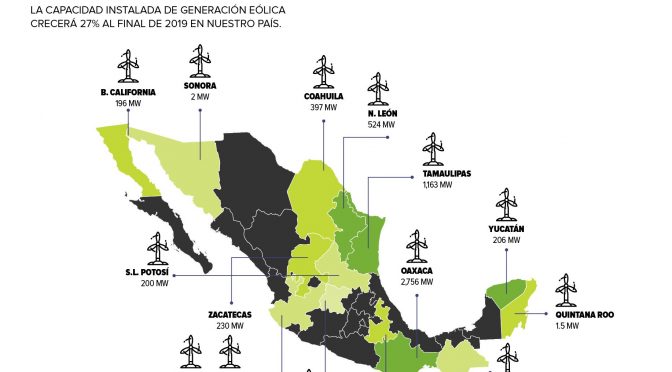The measures published last Friday by the National Center for Energy Control (Cenace), which suspends critical tests for new renewable energy generation projects, will delay the entry into operation of 28 wind and photovoltaic plants.
Julio Valle, director of the Mexican Wind Energy Association (AMDEE), assured that the agreement of the National Center for Energy Control threatens the investment of renewable energies in the country.
The expert stressed that the coronavirus was taken as a pretext to prevent this type of energy from beginning to operate and also to prevent the participation of other companies that are ready to offer more environmentally friendly services.
The agency decided to indefinitely suspend these tests, which are necessary for the implementation of the projects, arguing that it is necessary to provide stability to the electrical system during the health emergency derived from the coronavirus pandemic.
According to official information from the agency in charge of the electrical system, 17 renewable energy projects would come into operation in the remainder of this year and 11 more in 2021. All these projects will see their plans delayed due to the measure.
“After finishing construction, it is necessary to verify that the generation system is compatible with the system, that it operates in the conditions that the electrical system demands, you interconnect it and do tests before commercial operation. What they are doing is blocking these tests prior to entry into operation, and therefore all these plants cannot go into operation because you suspended the tests, “explains Víctor Ramírez, analyst of the sector and spokesperson for Plataforma México, Clima y Energía.
Thus, the 28 plants could not go into operation on their scheduled date because they did not demonstrate that their system operates in the conditions that the national electricity grid needs due to the absence of tests.
Of the total plants, 17 generate solar energy and the rest use wind energy technology with wind turbines. The projects are located in states like Yucatan, Campeche, Tamaulipas and Chihuahua.
In total they represent a generation capacity of more than 4 Gigawatts and represent investments of between 5 and 6 billion dollars, according to industry estimates.
This measure will also affect the renewable plants corresponding to the third long-term auction and which are currently under construction.
Although Cenace argues that it took these measures “to strengthen the electricity supply system,” according to the document published on Friday, voices such as the Business Coordinating Council (CCE) assure that this is a measure to favor electricity generation activities. of the Federal Electricity Commission (CFE).
“This new agreement takes up the regulatory capture route foreseen in the request form that the CFE submitted to the Energy Regulatory Commission (CRE) since August 2019,” says the business body.
Competition experts agree with what was expressed by the top organization of the business sector.
“It is a clear confrontation with the private sector to put a brake on them, even on investments that have already been completed. The Federal Competition Commission (Cofece) would have to review the competition conditions that are being violated with this agreement, ”says Ana Lilia Moreno, researcher at México Evalúa.
For ecosystem experts, this measure will contribute to the lack of certainty that is already perceived within the sector after the current administration changed the regulation for the issuance of Clean Energy Certificates (CEL) and decided to cancel the fourth long-term auction and the construction of two transmission lines.

